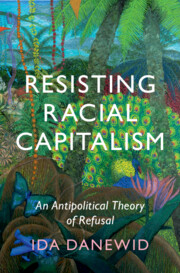‘An excellent presentation of the thesis of racial capitalism, Resisting Racial Capitalism revisits the archives of anarchism to remind us that social existence is conceivable, possible, and even preferable without the juridic formation, whose principal role has been to facilitate the economic goals of capital. This timely engagement with Cedric Robinson’s thought belongs in the shelves of persons and organisations working toward decolonisation and reparations for colonial and racial subjugation.’
Denise Ferreira da Silva - Author of Unpayable Debt and Toward a Global Idea of Race
‘This is political theory at its best. Ida Danewid moves from speculating about the state to calling for its abolition. Unearthing a subterranean archive of anarchist thought and practice across our shared planet, Danewid makes a powerful case for seeing all states as central to an ongoing war on people and the planet. Refusing to accept that not being governed belongs only in the realm of idealism and impracticality, we are invited to tread the well-worn path of making ourselves ungovernable. Danewid thus presents a radically different worldmaking project, one capable of ending racial capitalism’s violent regimes of separation and accumulation and reclaiming our freedom.’
Nandita Sharma - Professor of Sociology, University of Hawai‘i at Mānoa
‘Ida Danewid has gifted us a timely book, an incisive work of theory, history and imagination. She not only reminds us of the nature of the State - racialising, gendering, and hierarchy producing - but also makes a convincing argument for its abolition. Drawing from practices of refusal, she proposes an anti-political theory of refusal that invites us to collectively freeing ourselves from the shackles of racial capitalism.’
Françoise Vergès - Antiracist decolonial feminist activist, writer
‘Ida Danewid provides a kaleidoscopic view of the many ways in which state formation and state power is not simply coincidental to, but, rather, central to the expansion of racial capitalism. This clear-eyed analysis jettisons our fixation with reforming state power and unearths world-making otherwise to capitalist-colonial modernity.’
Harsha Walia - Author of Border & Rule and Undoing Border Imperialism





